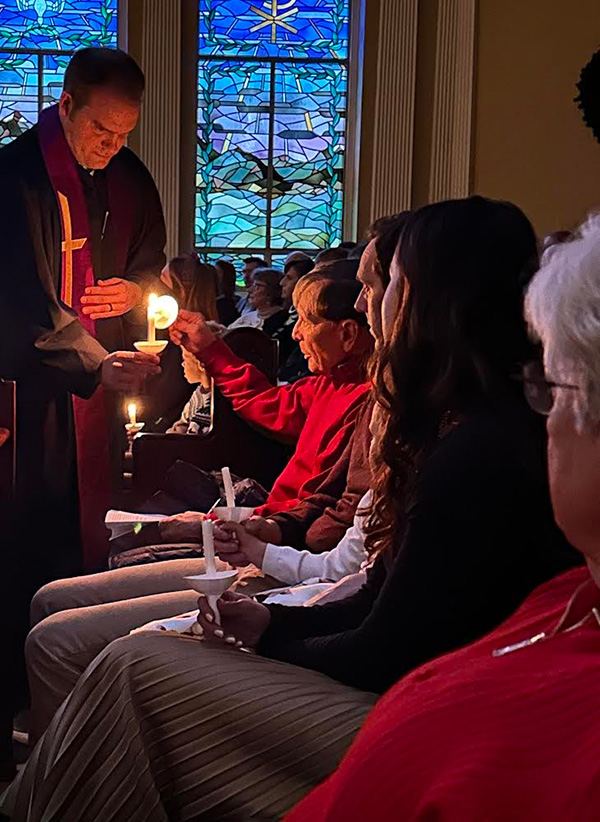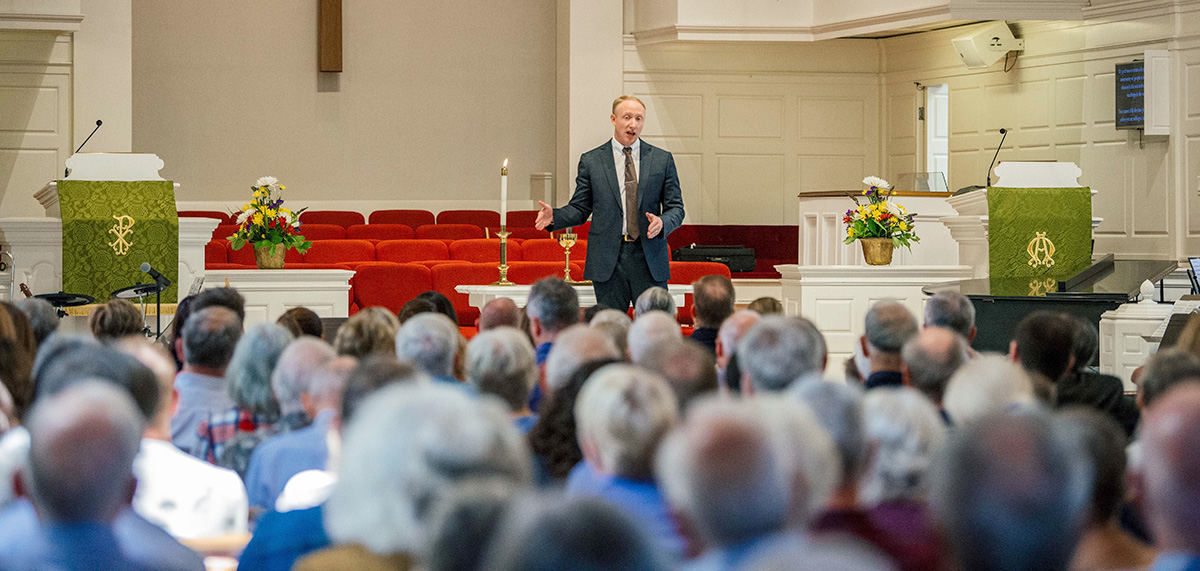February 6, 2024
Lessons from pastors who have left parish ministry

Afi Dobbins-Mays, right, speaks with attendees of an event at Mt. Zion Baptist Church in Milwaukee, Wisconsin, in 2023.
Though the number of pastors leaving parish ministry hasn’t amounted to a “great resignation,” those who have left still offer insight into the current state of the American church.
The Rev. Afi Dobbins-Mays proved resilient amid adversity throughout her first pastorate, serving two rural United Methodist congregations outside Madison, Wisconsin. But in 2022, a decade later, no amount of grit could keep her in ministry. By then, she was demoralized and needed a change.
She had overcome racism, aimed at her as a Black woman, including when individuals in her nearly all-white congregation had repeatedly refused to meet with her. Congregants had rallied behind her, raised awareness of the issue and helped bring in a diverse group of new members.
“There was a beautiful culture in that church,” she said.
But then her conference relocated her to a “critical mission site” (i.e., not financially self-supporting) in inner-city Milwaukee, where the stressors were many and the supports few.
Half the congregation of 60 quit the church upon her arrival, unwilling to have a woman in the pulpit. Grant funding was promised but fell through, she said. And when regional United Methodist decision makers called during pandemic hard times, it wasn’t to show support.
“They said, ‘What’s the reason why your church is not financially solvent right now?’” she recalled. “‘Why is it that you guys aren’t on your feet?’ It felt like a punitive conversation. They started cutting the money back.”
What does rallying to support a pastor look like in your congregation?

When a second congregation was added to her Milwaukee charge, her pay remained the same: about $43,000 plus benefits. She informed her district superintendent that she needed to earn at least $60,000 plus benefits, she said, but was told that wouldn’t happen in Milwaukee or anywhere else.
“I started looking into other options, because I didn’t really see a viable pathway to grow in my career after that conversation,” Dobbins-Mays said. “I didn’t feel supported in ministry.”
She worked briefly for a food bank before accepting a three-year position as assistant to the bishop for authentic diversity and leadership in the Greater Milwaukee Synod of the Evangelical Lutheran Church in America. She finds satisfaction now leading workshops on racism and oppression. And in a cause close to her heart, she’s helping launch a new ELCA camp next summer for children with an incarcerated parent.
Dobbins-Mays is one of a number of clergy who have left their jobs in parish ministry because of factors including managing institutional decline. And though there might not be a real “great resignation” of pastors, those like Dobbins-Mays can offer insights into the stressors affecting pastors in the U.S.
Expanding discontent among clergy surfaced in January when the Exploring the Pandemic Impact on Congregations (EPIC) study reported findings from a fall 2023 survey of 1,700 religious leaders. More than half (53%) said they’d seriously considered leaving pastoral ministry at least once since 2020. That’s up from 37% surveyed in 2021.
A closer look reveals that mainline clergy are the group most likely to consider leaving. Those particularly at risk include pastors serving congregations of 51 to 250 worship attendees with no ministry colleagues on staff; those in congregations that foresee struggling to survive — or closing — in the near future; those mired in congregational conflict; and those who say their congregations are unwilling to change to meet new challenges.
“The pandemic was a collective trauma both for the clergy and for the church,” said Scott Thumma, the director of the Hartford Institute for Religion Research (HIRR) and the principal researcher for the study. “Both of them suffered. And both of them, our research is showing, are collectively responsible for overcoming some of these challenges that lead to pastors thinking about changing congregations or leaving the ministry.”
The report is quick to add context to the percentage of pastors who have seriously considered leaving. Congregations are not seeing a collared exodus. Considering leaving and actually leaving are not the same thing. Numerous factors keep pastors in parish ministry, even if they’re not thrilled about it.
What are the stresses in your congregation? Who feels that stress most acutely?
“There’s not a spike in clergy retiring early or in their departure, at least through 2022, in the data from some of the denominations,” Thumma said in a webinar on the report. “I don’t think we’re going to see the ‘great resignation’ that many people have talked about.”
Nonetheless, those who have left in search of greener professional pastures might shed light on what needs fixing. That’s the expertise of Todd Ferguson, a Rice University sociologist of religion and co-author of “Stuck: Why Clergy Are Alienated From Their Calling, Congregation and Career … and What to Do About It.”
Ferguson names four factors that have led to a number of pastors leaving parish ministry: managing institutional decline; navigating conflict or division along political lines; feeling they couldn’t be their authentic selves in the congregational leader role; and facing disillusionment with a drifting mission.
A lack of resources
Demoralization doesn’t afflict just those who become burned out in ministry, as Dobbins-Mays did. Fallout from mainline decline is taking a toll also on people who still feel called but can’t make it work in today’s resource-constrained local settings.
Take the Rev. Loren Richmond Jr., a 41-year-old ordained minister in the Christian Church (Disciples of Christ). Richmond reluctantly began transitioning out of parish ministry in 2021 when he took a full-time job in local government. He now works for the Aurora Housing Authority, where he coordinates services for elders and veterans.
Do you see the four factors Ferguson describes in your congregation?

“I needed to make more money,” Richmond says flatly. “I don’t know if it’s feasible financially [to do parish ministry], at least at this stage of my life. And that’s really hard for me. I’ve committed 20 years of my life to this.”
The numbers just weren’t working. Having bought an average-priced house for his family of four in the Denver metro area in 2021, when interest rates were still low, he’s now paying down a $3,000 per month mortgage. Even with his wife’s income, they couldn’t swing it on his $45,000 salary for a three-quarters-time associate pastor and youth director position. He now earns $61,000 plus benefits in his government job.
Who is responsible for identifying and deploying resources in your congregation? Is the duty shared?

His departure from ministry came despite creative attempts to keep pastoring. After starting his government job, he continued working at Washington Park United Methodist Church in Denver on a reduced, quarter-time basis (10 hours a week). Yet even with his church duties scaled back, he was constantly thinking about the next sermon or next youth activity, until he couldn’t do it anymore. He gave his final sermon Jan. 14, 2024.
“After eight hours of work and two hours in the car, there was not a lot of stamina left, even to sit at the computer and do something church related,” Richmond said, holding back tears in a Zoom interview. “That’s really what it came down to. I found myself out of gas, mentally exhausted trying to manage it all.”
Growing divisions and threatened authenticity
When Ferguson says pastors leave ministry to escape feeling trapped in a political tinderbox, he could be talking about the Rev. Christi Tennyson of St. Louis. She left ministry in 2021 to become a fundraiser for Presbyterian Children’s Homes and Services.

Now 48, she was first licensed to pastor in 2015 and has been ordained in the United Church of Christ since 2018. She says she became a progressive thinker while reading the Bible deeply for the first time at Eden Theological Seminary.
“I’m not going [to] preach politics, but what I would preach were Christian values,” Tennyson said. “I tell people, ‘The whole crux of every world religion is — I’m going to use a bad word — don’t be an a——.’”
Before the pandemic, her approach to politics and liberal theology wasn’t a problem at Pilgrim United Church of Christ, a purple, aging congregation of about 55 in rural Labadie, Missouri. They knew each other. Serving 19 hours a week in the parish, she’d joined them in mission projects, such as hosting bluegrass concerts and a huge Halloween festival every year.
“They were really good at mission in their tiny town,” she said. “I loved the people. I still love the people. I miss them.”
But the pandemic pushed them apart, literally and relationally. Worshipping solely on Zoom for a year created a chasm that never closed.
“I felt I had lost the connection to my people,” Tennyson said. “I’m a hugger, and when you’re just looking at people over a screen, you lose the conversations that tell you what’s happening in their lives.”
With relational ties weakened, political differences felt sharper as in-person activities resumed. She listened as parishioners expressed negative views of various types of people, including immigrants, high-profile rape victims and women who’d had abortions. She came to think her “love your neighbor” preaching wasn’t making a difference. Their values were too far apart.
“I just felt like, ‘What am I doing?’” she said. “They listen for an hour a week, and then they leave and they’re spewing hateful rhetoric. … It was soul crushing.”
Along the way, trying to be authentic and forthright without alienating conservatives was a never-ending concern. She felt she had to hide who she was: a self-described “foul-mouthed sorority girl” who’d once had an abortion that saved her life. Her flawed humanity was a strength in the pulpit, she said, but always having to walk the fine line of congregational diplomacy was “exhausting.”
“A lot of times, pastors are hamstrung, because if enough people don’t like what you say, you will lose your job,” she said. “There was always fear on some level that I would say the wrong thing and make the wrong person angry and I would lose the job.”
Feeling burned out, Tennyson didn’t consider moving to a new church, because by the time she left in 2021, parish ministry didn’t fit her life anymore. Her marriage was heading for divorce. She expected that another congregation would not accept the spiritual authority of a recently divorced woman. She also didn’t want to feel judged for dating. And then there was the matter of money. Becoming a single parent meant she needed to earn more, but most UCC parish ministry jobs in her area aren’t full-time with health benefits, she said.
Now a successful fundraiser, Tennyson feels called to her new vocation. She’s grateful that she can pray daily with colleagues and do something to make the world better. In her new role, she’s a frequent guest speaker in local churches but no longer bears the weight of churchgoers’ expectations. She appreciates not having to manage what she calls “the church nonsense.”
Disillusionment with mission drift
On paper, the senior pastor position that the Rev. Alexander Lang accepted in 2013 was a plum. He preached to more than 500 in weekly worship attendance, worked alongside 15 staff colleagues and oversaw a budget over $1 million at one of greater Chicago’s most prominent mainline churches, First Presbyterian Church of Arlington Heights.
When a pastor does leave your congregation, do leaders ask about the forces that contributed to the decision?

“I don’t think that I could have found anything better in terms of a church,” Lang said.
But Lang wasn’t getting to do what he entered ministry to do, which was to “build community and create the kingdom of God on earth,” he said. Instead, he was devoting half his time to fundraising, committee meetings and other institution-supporting endeavors. After 10 years, he left the position this past August.
“The church is not really a church anymore; you have to treat it like a business,” Lang said. “Which is unfortunate, because if I’d wanted to run a business, I would have gone to business school.”
Signs of decline, such as a 50% drop in worship attendance over his decade in Arlington Heights, only increased the pressure he felt to keep the institution afloat. Along with that came pressure to assuage demanding parishioners and sometimes endure what he regarded as emotional abuse.
“There were people who felt like, ‘Because I helped to pay your salary, I can treat you any way I want,’” Lang said. “They felt like they could berate me without any real thought to what that means to me as a person.”

Lang became convinced that he’d need to leave ministry in order to live out his vocation as a change agent. He’d tried on several fronts, from delivering provocative sermons to laying groundwork for new social enterprises. But the large-scale change that he believes is necessary was a tough sell.
Lang is now an aspiring tech entrepreneur, seeking angel funding for a product he isn’t discussing publicly. All he learned about business in the church might be transferable to his new venture. At least that’s the hope.
Thumma, drawing on his research, has some advice for congregations hoping to keep their pastors from leaving ministry. First, he says, churches and clergy need to recognize that the last four years have been traumatic and the effects are still being worked out. Second, churches should try to find ways to reduce levels of conflict and find ways to appreciate the relationship between the clergyperson and the congregation.
“It’s pretty clear what creates a hospitable environment and reality for a flourishing congregation and what doesn’t,” Thumma said. The challenge is that it requires working constructively together.
The recent HIRR report said it well: “What is positively associated with fewer thoughts of leaving is … being in a church with a bright outlook for the future, one that has less conflict, is more open to change and adaptation, and cultivates a good, healthy [relationship] between the members and pastor.”
Who are the hopeful people in your congregation and community? How can their voices and influence be strengthened?
Questions to consider
- What does rallying to support a pastor look like in your congregation?
- What are the stresses in your congregation? Who feels that stress most acutely?
- A Rice University sociologist has identified four factors that push pastors to leave parish ministry. Do you see these factors in your congregation?
- Who is responsible for identifying and deploying resources in your congregation? Is the duty shared?
- When a pastor does leave your congregation, do leaders ask about the forces that contributed to the decision?
- Who are the hopeful people in your congregation and community? How can their voices and influence be strengthened?
